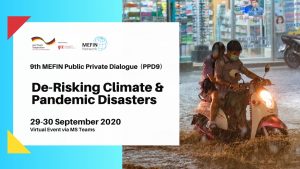The 9th MEFIN Public-Private Dialogue: De-Risking Climate and Pandemic Disasters
Context:
Although COVID-19 affects people across the world, the informal sector – low-income households often dependent on informal livelihoods and the informal micro and small enterprises – are disproportionately susceptible to its risks and adverse impacts. The difference in socio-economic factors, such as the lacking social protection and financial assistance mechanisms to the informal sector, leads the pandemic to intensify poverty and inequality.
Disasters, whether those arising from pandemics or climate change, put at risk not only people’s livelihoods but also their lives. Although these risks can be mitigated and prepared for to some degree, residual risk will always remain. This poses an opportunity for the insurance sector to understand and transfer the remaining risk to ensure that especially the vulnerable populations would be more resilient to the risks and impacts of disasters. Regular dialogue of the insurance industry with the financial services regulators, social protection agencies and climate disaster management authorities is key to sustainable delivery of risk finance solutions for the informal sector.
Key objective:
The aim of the 9th edition of Public-Private Dialogue (PPD9) – four-webinar series which will be held on 29-30 September 2020 – is to explore the role and possibilities of the insurance sector to help the low-income households and informal businesses to better cope with climate and disaster risks via appropriate disaster risk finance (DRF) solutions. More specifically, the webinar series aims to:
- Examine the role of social insurance and protection schemes in making the informal sector more resilient to climate and disaster risks, and ways to make these schemes more accessible.
- Discuss how the characteristics of different segments of the low-income households and informal micro and small enterprises should be considered in developing DRF solutions.
- Explore why and how to develop demand-driven DRF solutions together with the customers and beneficiaries.
- Highlight the role of the insurance sector, regulators and DRM authorities in managing climate and disaster risks as part of a more systemic effort.
To attain these, PPD9 involves four one-hour webinar sessions, each corresponding respectively to one learning objective, which are described on the following page.
Organizers:
PPD9 is the flagship event of the MEFIN Network, a forum of insurance regulatory authorities and industry players that promotes inclusive insurance. The Secretariat of the MEFIN Network is GIZ RFPI Asia (Rgulatory Framework Promotion of Pro-poor Insurance Markets in Asia program).
